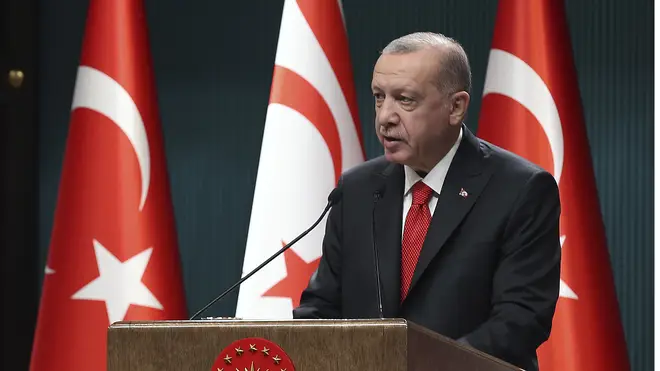
Richard Spurr 1am - 4am
28 October 2020, 14:54

Tensions between France and Turkey have mounted in recent months over Turkish actions in Syria, Libya and Nagorno-Karabakh.
Turkish officials have railed against French satirical magazine Charlie Hebdo over a cover page cartoon mocking Turkish President Recep Tayyip Erdogan, accusing it of sowing “the seeds of hatred and animosity”.
The cartoon could heighten tensions between Turkey and France which erupted over French President Emmanuel Macron’s firm stance against Islamism following the beheading of a teacher who showed his class caricatures of the Prophet Muhammad for a free speech class.
The Prophet cartoons upset many in the Muslim world, but it was Mr Erdogan who led the charge against France and questioned Mr Macron’s mental state. France then recalled its ambassador to Turkey for consultations, a first in French-Turkish diplomatic relations.
“We strongly condemn the publication concerning our president of the French magazine, which has no respect to faith, the sacred and values,” Mr Erdogan’s spokesman, Ibrahim Kalin, wrote on Twitter.
Mr Kalin said: “The aim of these publications, that are devoid of morality and decency, is to sow seeds of hatred and animosity. To turn freedom of expression into hostility towards religion and belief can only be the product of a sick mentality.”
The Ankara chief prosecutor’s office launched an investigation into Charlie Hebdo managers over the cartoon, the state-run Anadolu Agency reported. Insulting the president is a crime in Turkey, punishable by up to four years in prison.
The cartoon depicted Mr Erdogan in his underwear holding a drink and lifting the skirt of a woman wearing an Islamic dress.
Mr Erdogan himself said he had not looked at the drawing and had nothing to say about the “dishonourable” publication.
“My sadness and anger does not stem from the disgusting attack on my person but from the fact that the same (publication) is the source of the impertinent attack to my dear Prophet,” Mr Erdogan told his ruling party’s legislators in parliament.
He went on to criticise France and other European nations’ colonial past saying: “You are murderers!”
“I condemn this incorrigible French rag’s immoral publication concerning our president,” Turkish vice president Fuat Oktay wrote on Twitter. “I call on the moral and conscientious international community to speak out against this disgrace.”
Mr Macron’s stance sparked anti-France protests in Turkey and other Muslim countries, as well as calls for the boycott of French goods.
French government spokesman Gabriel Attal said the country would not back down in the face of what he called “efforts of destabilisation, of intimidation”.
“Despite this intimidation, France will never renounce its principles and values, and notably the freedom of expression and freedom of publication,” Mr Attal said.
“It was hateful comments toward journalists, toward a newsroom, that led to the bloodshed we have seen in recent years in our country,” he said, referring to the 2015 attack on Charlie Hebdo that killed 12 people and was the first in a series of extremist attacks on France.
Mr Attal announced the disbanding of another French group that authorities say is spreading dangerous radical Islamist messages.
In Egypt, the country’s top Muslim cleric called on the international community to adopt universal legislation criminalising anti-Muslim discrimination and activities.
At a gathering celebrating Prophet Mohammed’s birthday, Sheikh Ahmed al-Tayeb, Al-Azhar’s Grand Imam, also condemned the killing of teacher Samuel Paty in Paris as “an odious and painful murder”.
He said that offending Islam and Muslims has become a tool to mobilise votes, and called the “offensive cartoons” depicting Mohammed “a blatant hostility against this noble religion and its prophet”.
Egypt’s President Abdel-Fattah el-Sissi said that offending the prophet undermines “high values” many Muslims believe in.
Speaking at a Cabinet meeting, Iran’s President Hassan Rouhani also weighed in on the debate, saying: “If Europe and France are after rights, ethics and culture they have to withdraw from intervention in Muslim affairs.”
Pakistan’s prime minister Imran Khan, meanwhile, wrote letters to the heads of Muslim states, expressing his concern over the “ridicule and mockery” of Islam’s Prophet Muhammad and desecration of the Quran in the western world, especially in Europe.
Mr Khan wrote that “covert and overt discrimination” against Muslims is widespread in Europe.
“I believe the leadership in these countries, often acts out of lack of understanding of the intrinsic deep passion, love and devotion Muslims all over the world have for their Prophet,” he wrote, urging Muslim leaders to take the initiative to call for an end to this cycle of hate and violence.